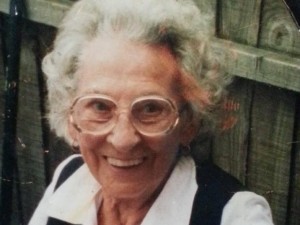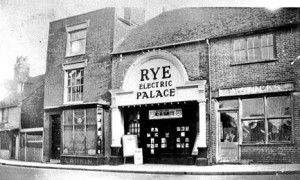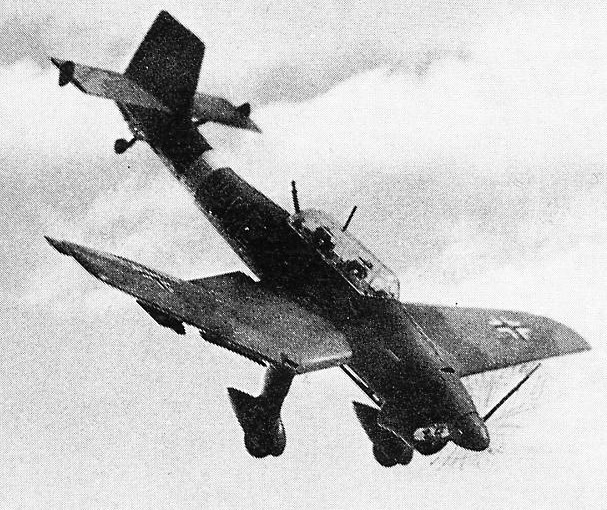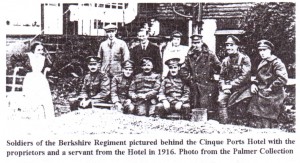 Winnie Hollands died on Sunday 10 June 2001. A very brave lady, she prepared two last ‘Adventures’ knowing that the sands of time were running away. They were completed just four days before she was taken from us.
Winnie Hollands died on Sunday 10 June 2001. A very brave lady, she prepared two last ‘Adventures’ knowing that the sands of time were running away. They were completed just four days before she was taken from us.
Adventures in Rye
By Winnie Hollands
Lying here in Richard’s house at St. Mary’s Bay in a room overlooking the sea I have had plenty of time to think back over 84 years and remember the highlights of my life. Everyone has to die at some point but when you know you have only a very limited time before you reach that point it really does focus the mind.
I have reached a stage where I no longer have the strength to write so I collect everything in my mind and dictate it to my son Jimmy on his regular visits.
I was born in 1916, in a little cottage behind the old Cinque Ports Hotel and brought up by my Gran as Winnie Wilson. My Mother lived and worked in Hastings. I never knew my Dad but many years later when I sent for a copy of my birth certificate it came back with the name Henry John Turner, Sargent King’s Royal Rifles (a Ships Cook) down as my Father. I have some idea that he was a soldier stationed at the stables at the back of the Hotel and that he went off to war and never returned. My Gran told me that she baked a current cake for every soldier that left the barracks on their way to France. As far as she could remember none ever returned.
My school-days were spent at The Lion Street School and my memories from these times were happy ones, even though my Gran eked out a meagre living by taking in washing and making gallons of tea for the farmers and stall holders at the weekly Rye Cattle Market, which was also a market place for all sorts of home-made and farm produce in those days.
I remember the Armistice Days in the years shortly after the Great War when we all stood for the two minutes silence in the School Yard and the bugler played the Last Post from the top of the Church.
May Day was another great day in the Rye calendar. Gran always bought me a little white summer dress and a pair of white shoes for this day, total cost four shillings and ten pence. There was a procession around the town ending on the Salts where we would perform a Maypole Dance.
Then, in November, there was Mayoring Day at The Town Hall, and in later years at the George Hotel, where all we children gathered expectantly in our lunch hour on the great day to scramble a few pennies with which we bought sweets from Miss Martin’s Sweet Shop next door to the School, a bar of Black Treacle Toffee was a penny. Freda Paine was my great friend through my school-days and after, when we started going to dances together. I kept in touch with her until she died back in the sixties.

On Saturdays we all attended the Electric Cinema in Landgate where for twopence halfpenny we watched moving pictures. A little man, I can’t remember his name, played enthusiastically on the piano. I remember the very first sound film with Al. Jolson singing ‘Mama’. This must have been about 1930.
I was thirteen when the new Cinema was opened on the site of the old Bijou Theatre in Cinque Ports Street and remember taking part in the weekly Talent Competition held there on Saturdays. I once came third dancing the Charleston but never actually won.
My Gran arranged my first job as a live in housemaid at Moneypenny House, East Guldeford. Gran also scraped up the money to buy me a bike so that I could get to Rye on my day off. Later I worked at the Flushing Inn.
I worked at Petronella’s Tea Plait in Winchelsea and during this time was confirmed at Winchelsea High Church. I don’t recall much about my time in Winchelsea except that I attended Dr. Finch for a tuberculosis jab.
My next job was at the Hope Anchor. These were the times in the mid thirties` when dancing was the big thing. This was where you met other young people and made the most of the few free hours that were available to you. I remember rising at six and knocking on Hotel owner Miss Bellhouse’s bedroom door precisely as the Church Clock chimed seven with toast, orange juice (just squeezed) and coffee. I worked until 3pm. when there was a two hour break. Then back on duty until nine. On Saturdays I sneaked out to get to the Monastery where we danced to live Dance Bands Then it was back to the Hotel, in a window left unlatched and quietly to bed. Then up again at six ready to start another day. We did not have much money but we certainly enjoyed life.
I first noticed Jim Hollands at dancing classes held in what is now Ian Addy’s repair shop at the end of St Margrets Terrace. He used to chase me back to the Hope Anchor. I did not like him much at first and got Harry Corner to walk me home. Jim did not give up and eventually I started to go out with him after an open air dance held on the Car Park at Camber where Fred Taylor provided the music, waltz, foxtrot, quickstep and Charleston, on a Radio-gram. I got there on the back of Harry Corner’s motor bike and walked home through the Camber Fields with Jim. We walked out for a couple of years and then I was taken ill with Diphtheria, a contagious disease, and carted off on a horse and trap to the Isolation Hospital at Udimore. No visitors were allowed but Jim called up and threw an engagement ring through the window. How could I refuse him?
I went to work for Jim and his Father ‘Jumbo’ Hollands at their grocery shop in Cinque Ports Street. First at number six and later at number twelve.
We were married on Christmas Day 1937 at St. Marys Church by the Rev. John Fowler. John Hirst was the assistant priest.
Jimmy came along in November 1938. We all lived at No. 12. Jim’s mum and Dad, his two sisters, Nellie with new husband George and Betty.
Then the War came, and along with the rest of Rye, we battened down the hatches and waited with baited breath. Hitler invaded Belgium and France and the British Army was driven onto the beaches at Dunkirk. Small boats from Rye were included in the huge fleet of vessels that rushed to the rescue and lifted our men from that terrible trap.
Jim joined the Home Guard and set off with his broom handle. I don’t know how they expected to repel an invasion armed like that but they were determined that the Germans would not take Rye without a fight.
I was evacuated, along with most of the women and children in the town, to Dorset. I returned to Rye as soon as the invasion scare had passed. We kept the grocery store going through the war years. It was hard going, everyone was rationed and often we did not get enough stock to cover all our customers. Many times Jim would raid my larder and pinch one of our own tins of condensed milk or something to satisfy a customer. I remember the Regent Cinema getting bombed one afternoon. I have vivid recollections of my husband Jim taking little Jimmy along in the front of a carrier bike to see if Sid Baker at the Co-op was alright. He found Sid shaken but safe. The Regent was flat except for the front wall which still stood. The toilets were open to the sky and water was pouring down the front of the building. A soldier had written on the fascia “Gone with the Wind”.
Many homes in Rye were destroyed or damaged during the war but the only two landmark buildings, the Regent and the Wesleyan Church, were bombed beyond repair.
Despite the constant danger we were in, being so close to the coast, the spirit of Rye people was tremendous. We all helped one another and still tried to enjoy ourselves by going dancing on Saturdays, baby sitters were no problem in a house like ours, or picnics on Sundays. Hitler was not going to get us down. That was the view of most Ryers and I am sure of most British people.
Robert came along in 1941, a wartime baby. My sister Lil came down to live with us, getting away from the Blitz in London. Her husband, Percy Hopes was in the army serving abroad. We had several Canadian soldiers billeted with us at this time. They were lovely chaps, keen to get at the Germans. Suddenly they were gone, taking part in the Dieppe Raid. Most of them were killed or captured. My brother Stan died with them, he was serving on a minesweeper. Stan loved Rye, he spent all his leaves here and had many friends in the town. These were sad times when the war came right home to you and changed things forever.
We had so many loyal customers at the shop, most were much more than that, they became firm friends. They joked about last nights ‘tip and run’ raid and talked of finding pieces of hot shrapnel in Cinque Ports Street after the raiders had passed. Most men had two jobs, in the daytime they were shopkeepers, bankers, road sweepers and at night they were fire watchers, air raid wardens or members of the Home Guard. By 1942 we were all weary of the war and longed for normality again. Little did we know it would go on for three more years before there were ‘blue birds over the white cliffs of Dover and Jimmy could go to sleep in his own little room again’.
“Rye’s Own” July 2001
All articles, photographs and drawings on this web site are World
Copyright Protected. No reproduction for publication without prior
arrangement.
© World Copyright 2015 Cinque Ports Magazines Rye Ltd., Guinea Hall
Lodge Sellindge TN25 6EG

